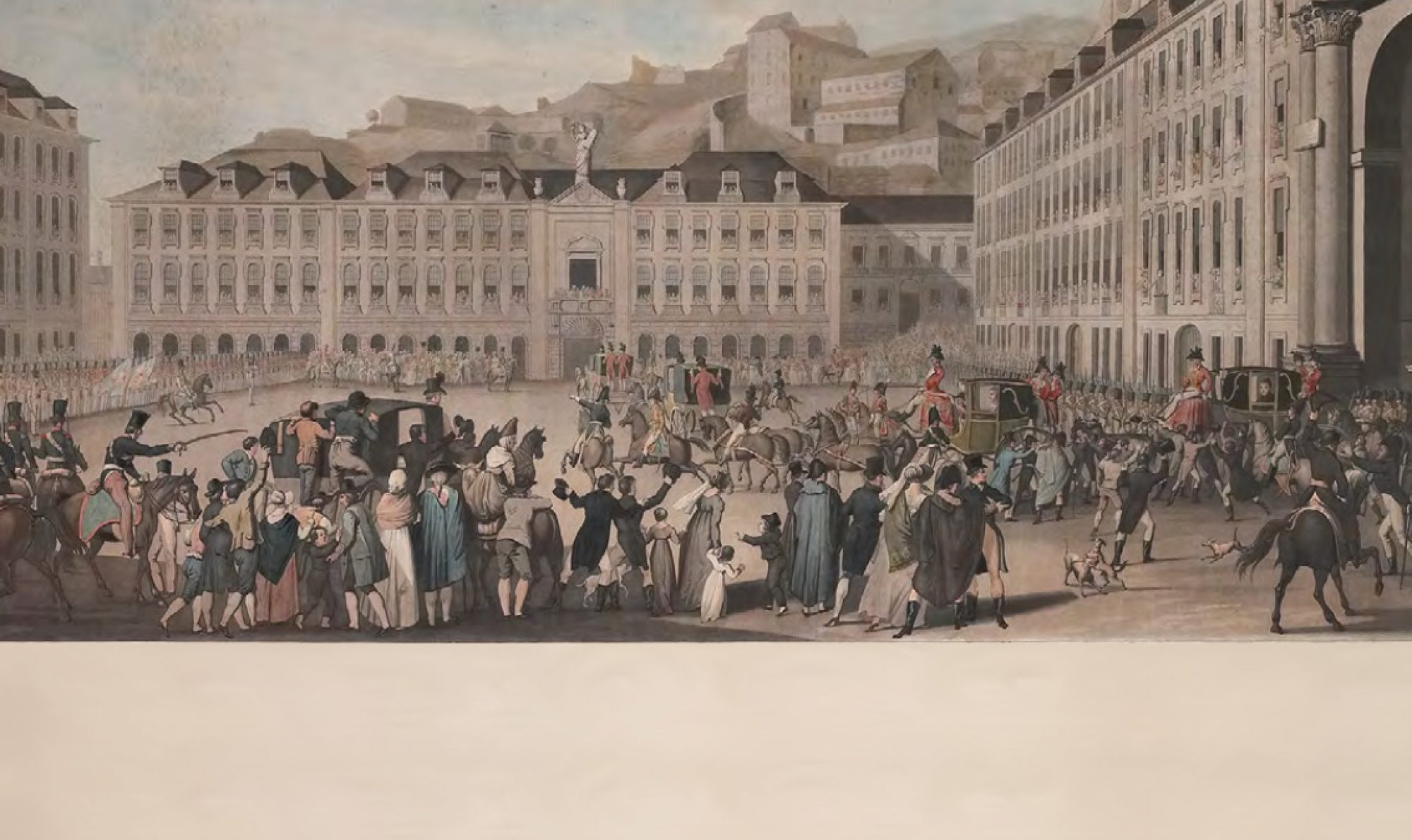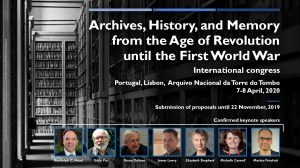11 March 2020
Due to the COVID-19 epidemics and complying with the decisions of the governing bodies of the Universidade Nova de Lisboa (https://www.unl.pt/en/news/general/march-10-contingency-measures-covid-19), which follow the recommendations of the Portuguese health authorities, the congress was cancelled on the scheduled dates. The organising committee is actively working on its postponement to early November 2020. We will provide additional information on this as soon as possible.
Archives, History, and Memory from the Age of Revolution until the First World War
International congress
Lisbon, Arquivo Nacional da Torre do Tombo/Colégio Almada Negreiros, Faculdade de Ciências Sociais e Humanas (NOVA FCSH), Universidade Nova de Lisboa, Campus de Campolide, 7 and 8 April 2020
Keynote speakers pdf
Organisers: Instituto de História Contemporânea (IHC, NOVA FCSH), in partnership with the Instituto de Estudos Medievais (IEM, NOVA FCSH) and the Arquivo Nacional da Torre do Tombo (ANTT)
Historical context
The long nineteenth century witnessed four major historical processes of the utmost significance: the modernisation of the state, nation-state building, the independence of the American colonies from Europe, and the colonisation of the African and Asian continents. The modernizing of the state entailed its growth and bearing on the economy and society, the widening of the state’s role, the “bureaucratization” of its administrative apparatus, and protracted democratisation. Along came the reduction or removal of competing powers, namely the church and aristocracy. The state also became a vehicle for the enshrinement of private property, free enterprise and, increasingly, the freedom of association among citizens. In addition, the modernised state would favour and support nation-state building in a number of ways.
All of this gave rise to a fresh backdrop for information and archives, around which the conservation of administrative proof and the narrative of national history would be structured. Transformations were not confined to the European metropolises, rather these served as a model also for the former colonial territories in the Americas. In the now-independent states, these processes were challenged with integrating diverse peoples and the very different social backgrounds of their inhabitants.Regardless, in the metropolises and the former colonies alike, large sectors of the population escaped state networks and were reflected but dimly in the documentation that the state produced.
Objectives and geographical and time spans
The aim of this congress is to bring forward debate on these processes by calling up scientific areas within history which, due to their recent development — namely the history of archives and information — are yet to be fully taken on board. At the same time, this congress seeks to make sense of the contributions from other social and human sciences, amongst which the new fields of archival and information science. The congress is part of the Instituto de História Contemporânea’s agenda for the bicentennial of the Portuguese liberal revolution of 1820 which represented an important turning point in relation to the processes mentioned above, regarding Portugal and its colonies. However, the meeting sets out to analyze a long time frame, spanning from the end of the eighteenth century to the beginning of the twentieth century, considering the different rhythms of the processes of institutional development, in Portugal and its empire as much as in other European states and their colonial spaces.
Sections, issues for analysis and topics suggested
Section I — Modernisation of the state and a new setting for information and archives
How did the introduction of national archives reconfigure the production and conservation of information in the European metropolises, and how did this link to the transformation (in some cases the extinction) of strong archive-producing organisations?
Topics: from crown archives to national archives; central archives and peripheral administration archives; municipal archives; church archives; the archives of private companies; confraternities, misericórdias and associations; the archives of families and of noble households.
Section II — Archiving the empire
How did colonial archives serve the governmental purposes of metropolitan administration and how did they relate with the keeping of evidence and the memory of local populations? How were the historical archives of the old imperial territories reconfigured and what happened to their holdings?
Topics: the archives of the new states in the Americas; colonial archives.-history-and-memory
Section III — Processing the past: archivists and historians in defining boundaries
How did the profession, training and knowledge of the archivist evolve? What role did historians play in creating the new landscape in archives and information? In which ways did historians relate to archives, and how important was archival documentation for the emerging of history as science?
Topics: transformations in archivistics and the profession of the archivist; interpreters of the past: historical writing and archival documents.
Section IV — Beyond the archive
How to document subaltern and excluded groups poorly represented or even absent from state archives, despite the liberal state’s rhetoric of inclusion and equality?
Topics: documenting the subaltern and the excluded; orality and tradition as forms of evidence and memory.
Program
Final program pdf
Dates
Submission of proposals for papers: until 22 November 2019
Notification of acceptance: no later than 20 December 2019
WARNING: Notifications were sent by email on December 17th. If you have not received a message, we suggest that you check your spam folder.
Languages
Portuguese, English, Spanish or French.
Registration (for participants who do not give a paper)
Registration is free, but participants who do not give a paper must fill in the following
.
Useful information
Venue
7th April (morning): Arquivo Nacional da Torre do Tombo, Alameda da Universidade, 1649-010 Lisboa;
7th April (afternoon) and 8th April (whole day): Colégio Almada Negreiros (CAN), FCSH, Universidade Nova de Lisboa, Campus de Campolide, 1099-085 Lisboa
Accommodation
We provide a list of hotels and approximate prices. Some of them are closer to the campus than others. NOVA FCSH has a protocol with some of the hotels, which you can benefit from by booking directly with the contact person
Lunches
At Colégio Almada Negreiros you will find places to lunch:
- The canteen, where the menu costs about 6,5€ all included
- The restaurant, where the menu costs 10€ all included
There are also some restaurants nearby (outside the campus), which menus are about 10€. Nevertheless, to get there you have to walk and wait some time since these restaurants are usually quite busy
Publication of papers
Following the congress, authors will be invited to submit full papers for publication in an e-book after positive assessment by anonymous peer-review.
Organisation
Organising committee
Maria João da Câmara (CHAM, NOVA FCSH), José Maria Furtado (ANTT), Joana Vieira Paulino (IHC, NOVA FCSH), Maria de Lurdes Rosa (IEM, NOVA FCSH), Luís Espinha da Silveira † (IHC, NOVA FCSH).
Scientific committee
Ana Canas (ULisboa/FL), Paula Godinho (NOVA FCSH), Silvestre Lacerda (ANTT), Sérgio Campos Matos (ULisboa/FL), Paula Ochoa (NOVA FCSH), José Pedro Paiva (UCoimbra/FL), Ricardo Roque (ULisboa/ICS), Maria de Lurdes Rosa (NOVA FCSH), Carlos Guardado da Silva (ULisboa/FL), Luís Espinha da Silveira † (NOVA FCSH), António Sousa (ArqDistrital Braga), José Subtil (UAutónoma Lisboa), Luís Reis Torgal (UCoimbra/FL), Irene Vaquinhas (UCoimbra/FL)
Contacts: congahm@sapo.pt
Call for papers pdf

